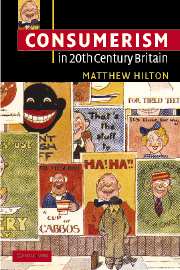Book contents
- Frontmatter
- Contents
- List of illustrations
- Acknowledgements
- List of abbreviations
- Introduction: luxury's shadow
- Part I Necessity
- 1 Socialism, co-operation, Free Trade and fair trade: the politics of consumption in the nineteenth century
- 2 Revolutionary shoppers: the Consumers' Council and scarcity in World War One
- 3 The right to live: consumer ‘ideology’ in inter-war Britain
- 4 The price of depression: consumer politics in inter-war Britain
- 5 Austerity to affluence: the twilight of the politics of necessity
- Part II Affluence
- Conclusion: the quantity or the quality of choice
- Bibliography
- Index
3 - The right to live: consumer ‘ideology’ in inter-war Britain
Published online by Cambridge University Press: 10 December 2009
- Frontmatter
- Contents
- List of illustrations
- Acknowledgements
- List of abbreviations
- Introduction: luxury's shadow
- Part I Necessity
- 1 Socialism, co-operation, Free Trade and fair trade: the politics of consumption in the nineteenth century
- 2 Revolutionary shoppers: the Consumers' Council and scarcity in World War One
- 3 The right to live: consumer ‘ideology’ in inter-war Britain
- 4 The price of depression: consumer politics in inter-war Britain
- 5 Austerity to affluence: the twilight of the politics of necessity
- Part II Affluence
- Conclusion: the quantity or the quality of choice
- Bibliography
- Index
Summary
In 1928, the historian of the Co-operative movement, Percy Redfern, was invited by the publisher, Ernest Benn, to collect together a series of essays on ‘social and economic problems from the hitherto neglected point of view of the consumer’. Dominated by co-operative thinkers and activists such as Beatrice Webb and A. V. Alexander, the twenty-four pamphlets attest to the richness and variety of consumer ‘ideology’ in the inter-war period. Co-operation and socialism were broadened to include a notion of the consumer as citizen, standing hand-in-hand with the worker in the struggle for the ‘co-operative commonwealth’. Prominent figures of the Left such as Harold Laski, Philip Snowden, Leonard Woolf, Walter Citrine and Margaret Bondfield wrote of consumerism as a new force in society acting for ‘the people’ and social justice. The influence of the Self and Society series was limited, in terms of its impact upon mainstream party politics, and it is difficult to argue that a unified consumer philosophy emerged. But to apply a test of theoretical precision to abstract ‘consumerism’ is to miss the diversity and contradictions that have ever dominated the politics of the Left, never mind any specific definitions of ‘socialism’ or ‘trade union consciousness’. What the Self and Society series highlights is the flourishing of consumerist thought during the 1920s and 1930s which would see the Ruskinian and Morrisian tradition revived through the works of J. A. Hobson, the development of the concept of the ‘living wage’ by the Independent Labour Party (ILP), the progression of co-operative thought and propaganda and the promotion of new ideas and strategies as diverse as Major Douglas' thoughts on social credit, G. D. H. Cole's advocacy of guild socialism and the focus on research, evidence and forecasting by Political and Economic Planning (PEP).
- Type
- Chapter
- Information
- Consumerism in Twentieth-Century BritainThe Search for a Historical Movement, pp. 79 - 107Publisher: Cambridge University PressPrint publication year: 2003



